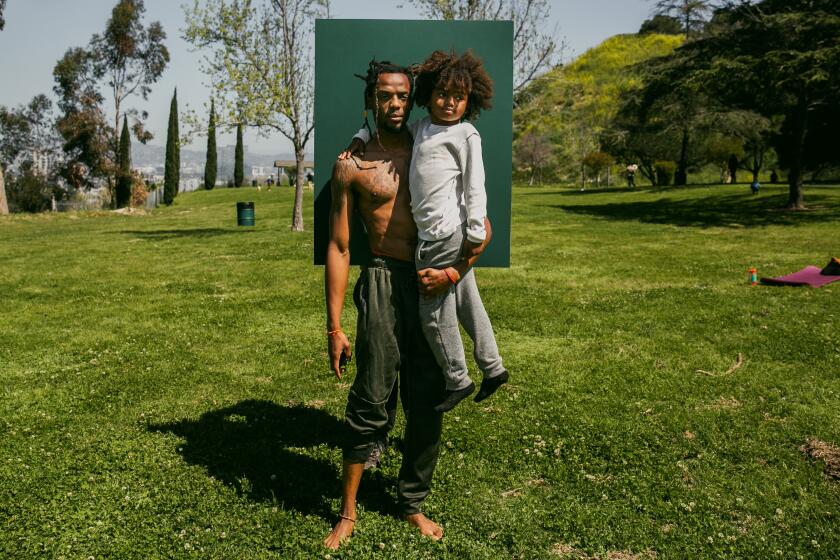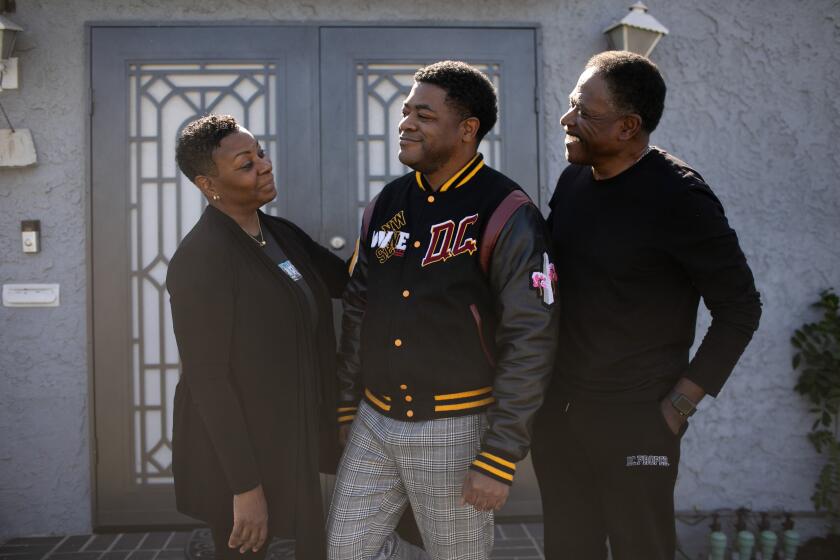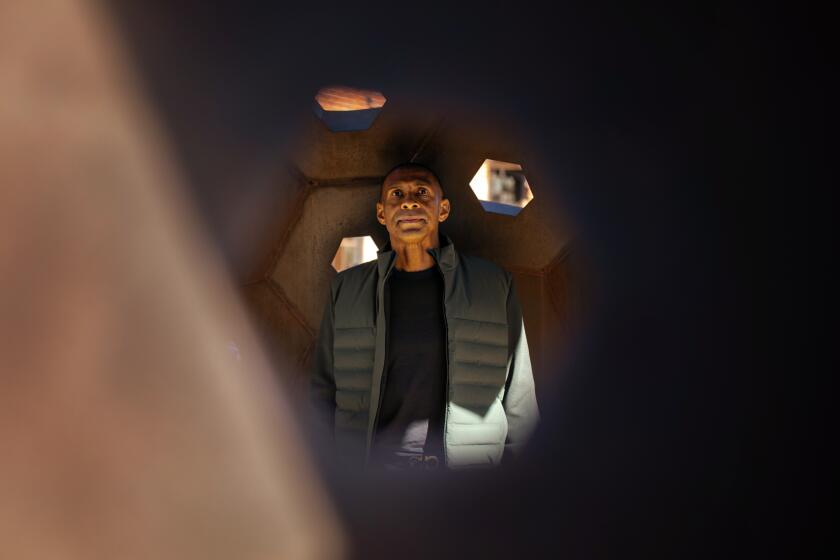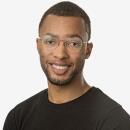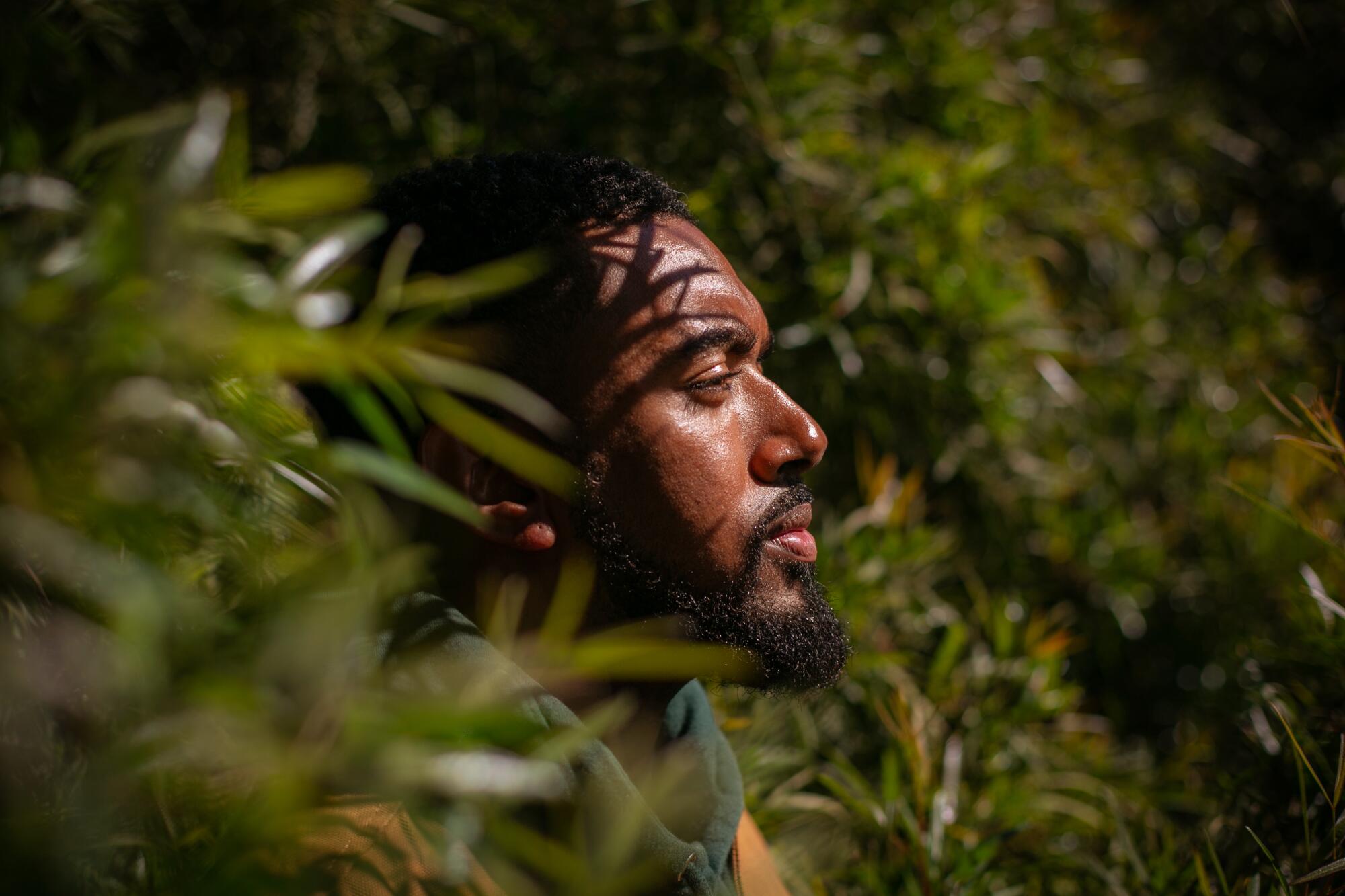
- Share via
“Tell somebody hi! Meet somebody new! Find someone to dance with!”
A jubilant Marley Rae Ralph bounded through the grass at L.A. High Memorial Park on Easter Sunday, calling out to panting onlookers at the close of a yoga session hosted by WalkGood LA. “Matter of fact — y’all come to the middle! Everybody off your mats!”
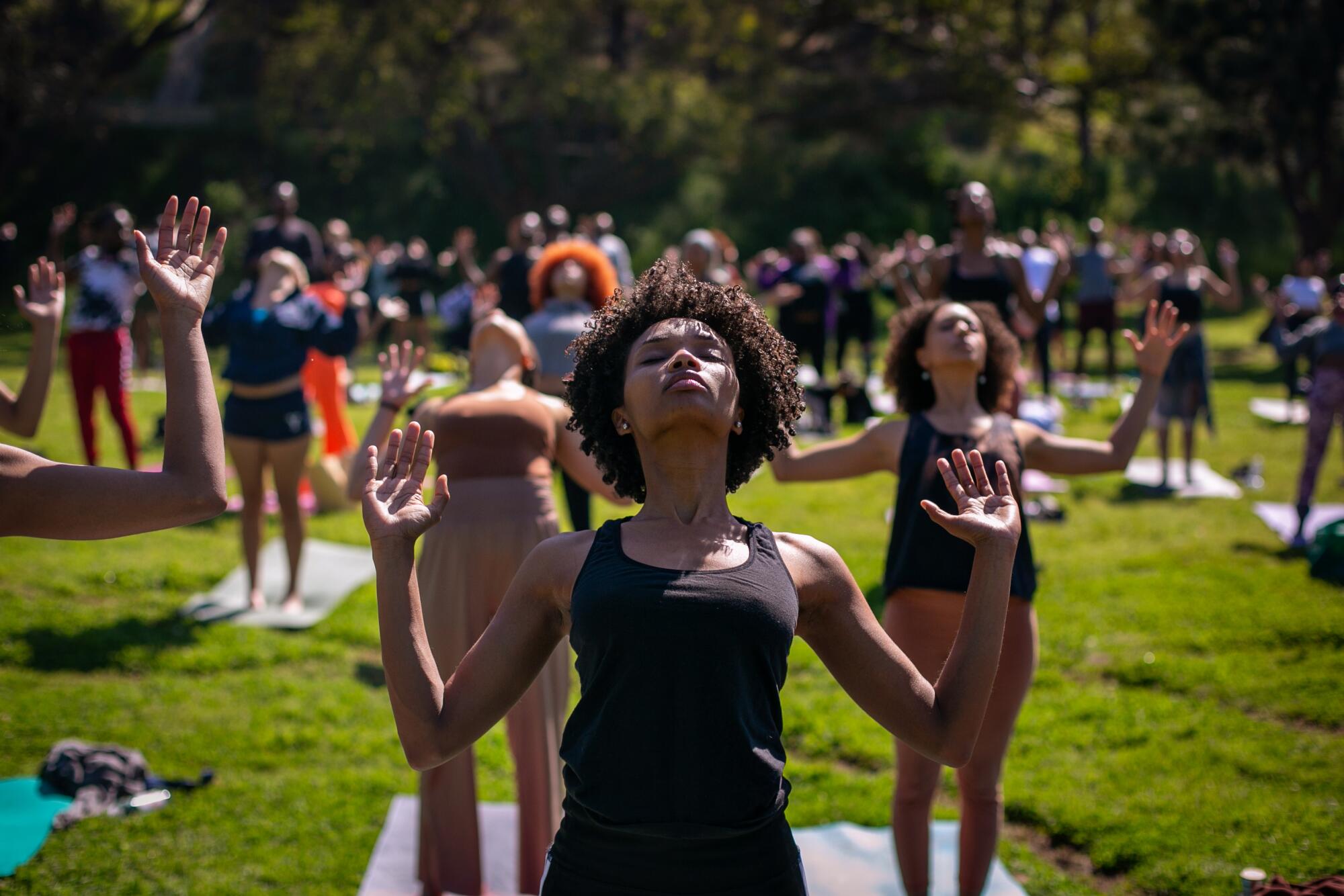
Ralph had just led the group in nearly 100 minutes of downward dogs, ab exercises and breath work, leaving many content to splay in the springtime sun in satisfied inertia. But Ralph gleefully pushed them through their fatigue, linking arms with her cousin and WalkGood founder Etienne Maurice and beckoning her crowd to come toward her.
Attendees mutely shuffled in place at first, until Ralph’s resolve pulled them in and turned them up. And what started as a communal two-step slowly morphed into a full-blown electric slide across the park, soundtracked to Kirk Franklin’s demonstrative “Stomp.”
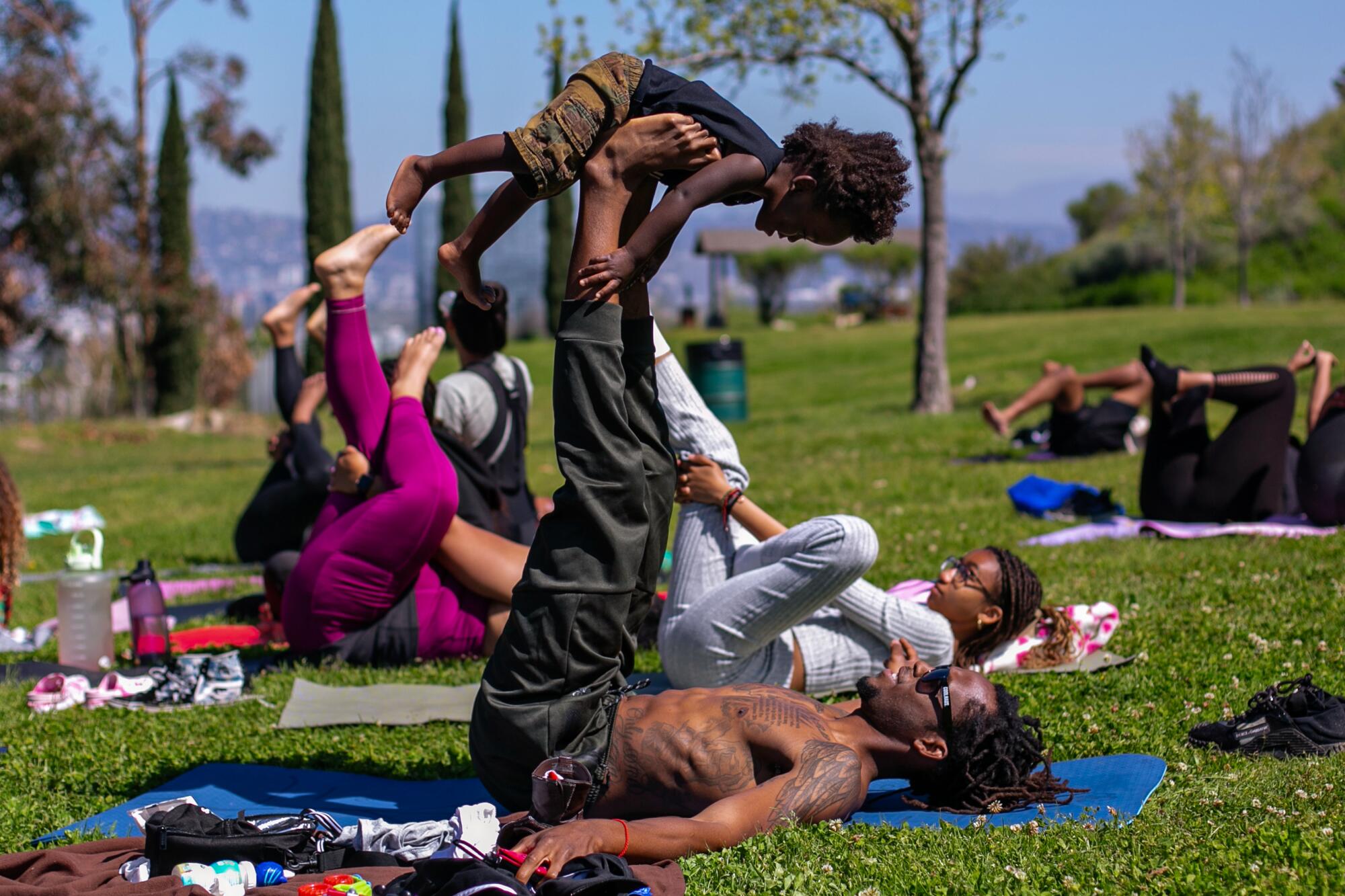
“Easter Sunday has such a special place in my heart,” Ralph said via Zoom in June. “We used to spend Easter Sunday with our grandee and grampee, who are really the guardian angels of WalkGood. But that Easter Sunday [in the park] was such a cool moment, because we were able to let go.
“A lot of the class is breath to movement,” she continued. “But I think there’s also time and space for the soul to take over, when it needs to take over.”
Birthed from a protest against police brutality in the summer of 2020 following the murder of George Floyd, WalkGood has evolved into a multifaceted, wellness-driven organization routinely drawing hundreds of people out of their homes in search of self-betterment. Three years in, yoga is one of several programs: There’s a weekly running club (“RunGood”), an annual short film festival (“FilmGood”), a monthly hiking group (“HikeGood”) and, Maurice’s personal favorite, “YouGood?” — a space for men to come together monthly for journaling, meditation and soul-baring conversation. (There’s also an equally cathartic event for women called “YouGoodGyal?”)
“You don’t see Black men collectively coming together to focus on their mental health,” Maurice said. “It’s a space where Black men — and all men — can be vulnerable and transparent with each other.”
Maurice remembered creating a protest flier under the name “WalkGood RunGood” in June 2020, blasting it across texts, group chats and social media to round up as many as possible to L.A. High Memorial Park. That day, the protest was the main event, but to get people in the right mindset, he asked Ralph to lead stretches before and after the event.
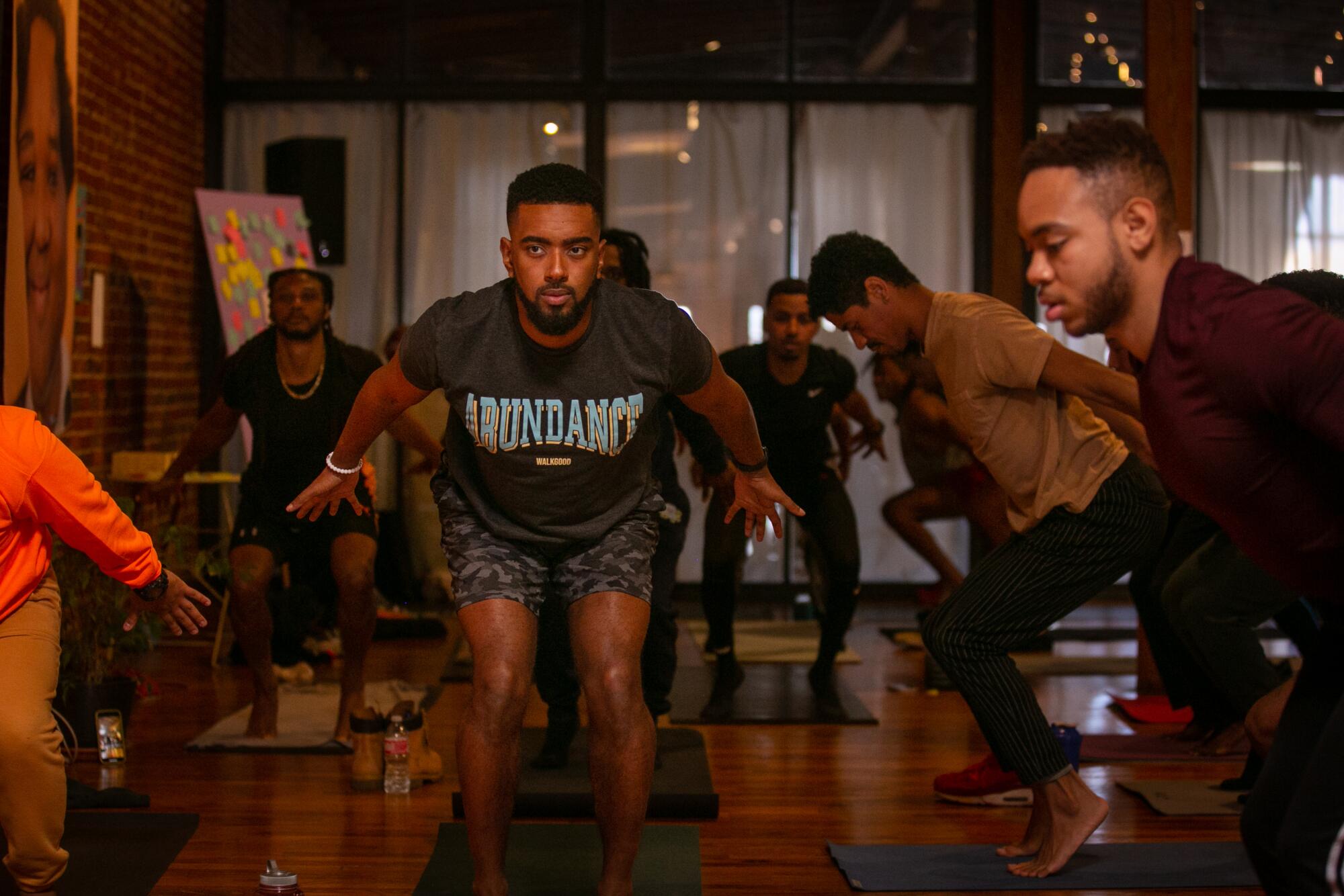
Ralph’s own introduction to yoga had come years earlier, while studying abroad in South Africa in 2017. She earned her yoga certification the following year after returning to Los Angeles, and remembered tricking her friends into doing hot yoga with her before the pandemic — “they thought it was going to be a very zenned out, namaste class,” she laughed.
But when Maurice asked her to lead stretches before the protest, she found a much more willing audience.
“It was such a beautiful moment to see everybody really take that time for themselves, as we grieved the loss of our brothers and sisters,” Marley said. “The magic that happened was really undeniable. We felt the energy shift from super tense to a much more relaxing state.”
“What I didn’t realize is that people needed healing more than fighting,” Maurice added. “That changed my perspective in how we were going to build WalkGood.”
The journey hasn’t been entirely smooth; about a year after the group held its first protest, it found itself in the crosshairs of L.A. parks and recreation, which booted WalkGood from L.A. High Memorial Park citing noise and parking complaints. (Maurice said he‘d never heard anything but positive messages from the park’s nearby residents, especially after he’d grown up in the very same neighborhood.)
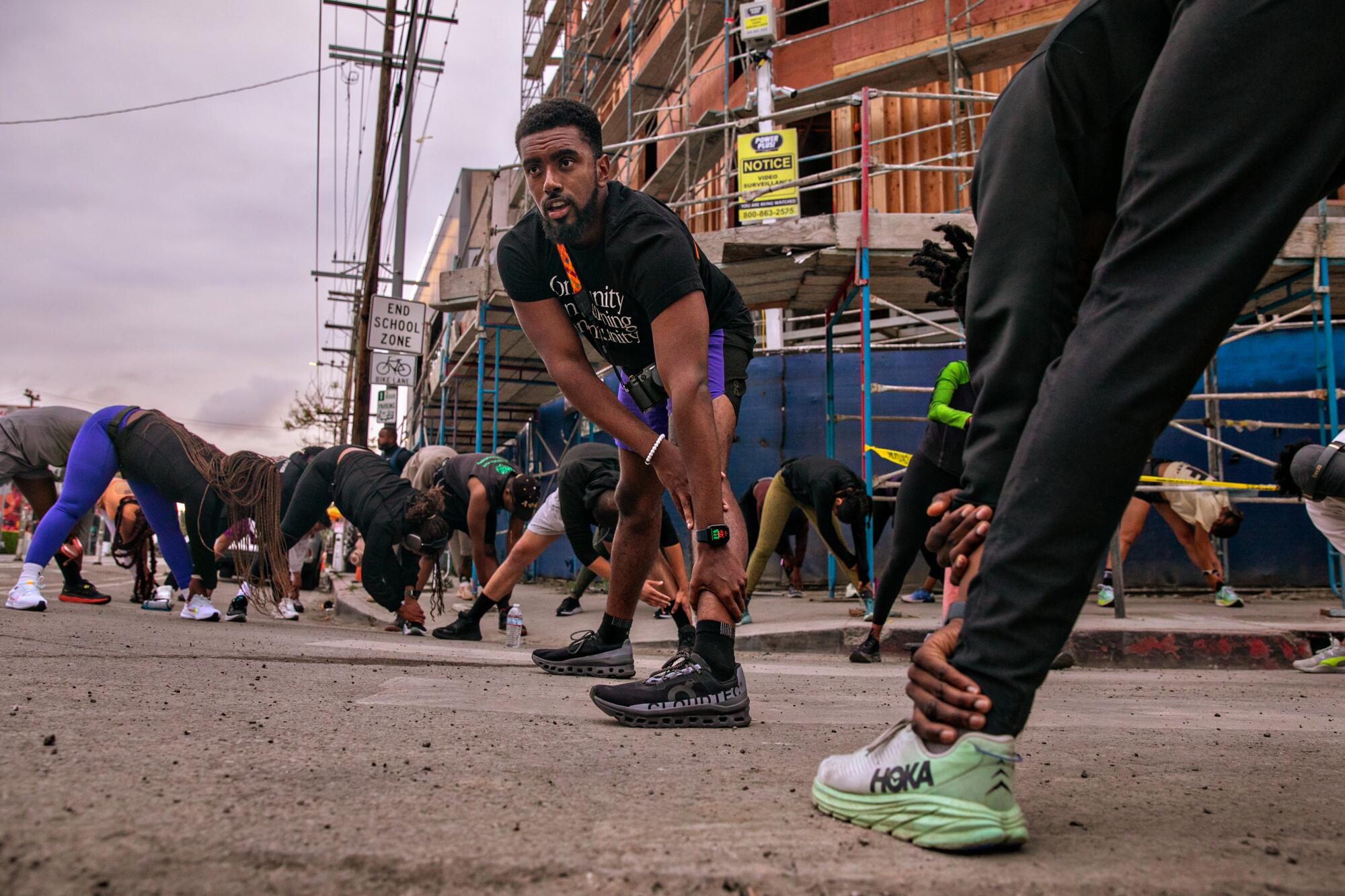
The story nearly ended there, as the organization wandered about the city for infrequent pop-ups, even hosting an event on Instagram Live in August 2021. But at the end of that year, then-new L.A. County Supervisor Holly Mitchell connected with the group, working to tie it with the county-operated Kenneth Hahn State Recreation Area in the absence of city support.
“I am so thankful for Holly, because if not for her, we would not be in this park,” Maurice said. “She made sure we could hold space here.”
Through it all, WalkGood has remained a family affair. Maurice serves as CEO, while Ralph directs health and wellness, and Ivy Coco Maurice, Maurice’s sister, operates as vice president. Emmy-winning actor Sheryl Lee Ralph, Etienne and Ivy Coco’s mother, often attends events (and gave a speech at WalkGood’s three-year anniversary celebration in June).
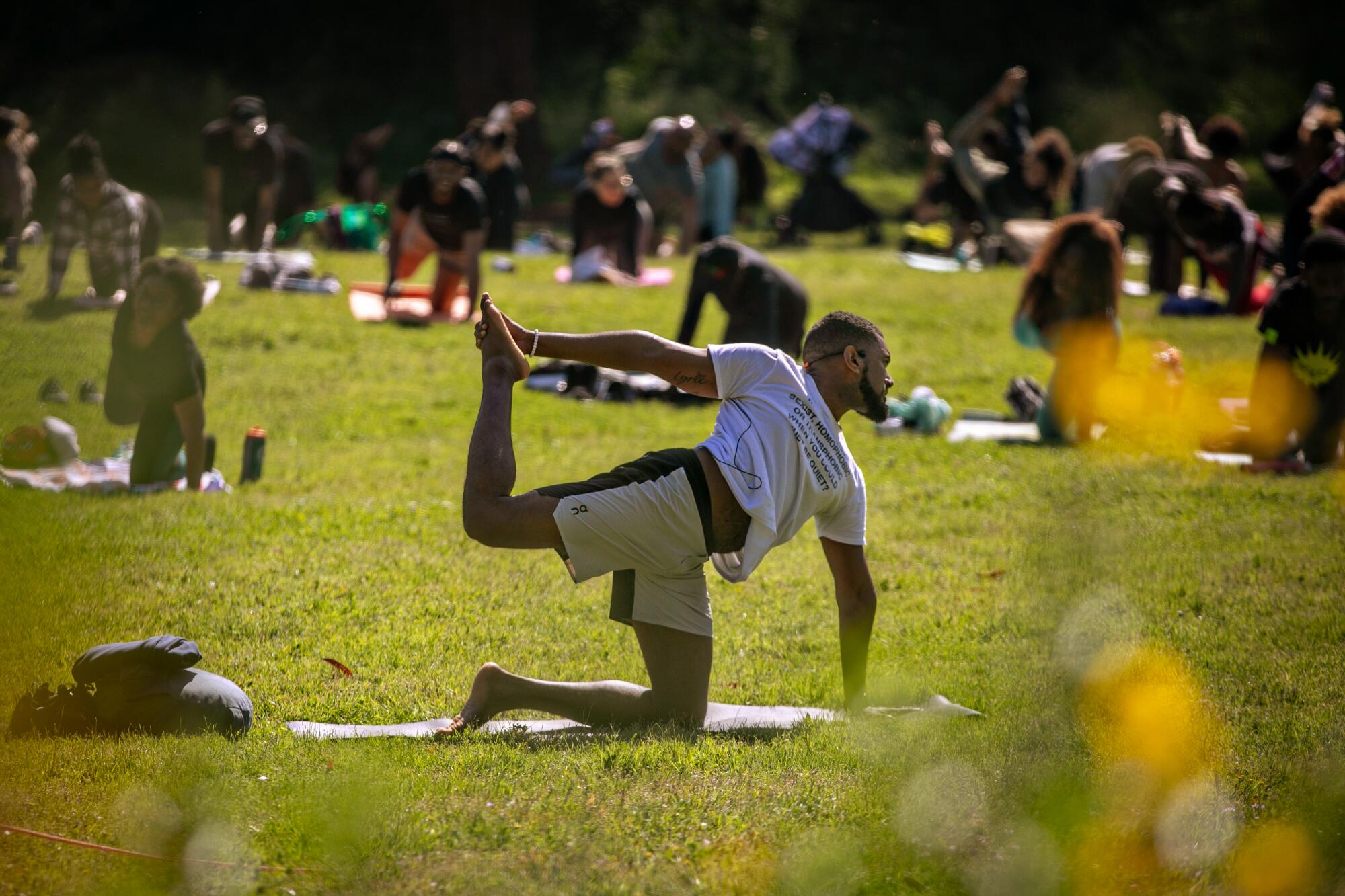
The three liken themselves to the three dominant colors of the Rastafarian flag; Ivy Coco supplies shades of green with her grounded nature and calming presence, and Ralph brings the yellow rays of light to brighten even the darkest days. And while the two of them are busy with their non-WalkGood obligations — Ivy Coco is a stylist and creative consultant, while Ralph is a postproduction voice-over actor who also leads her own wellness retreats — Maurice is the lifeblood of the organization, dedicating the majority of his week to furthering its growth.
“It takes someone who’s willing to be fearless, able to unite and be the leader of the pack,” Ivy Coco said of Maurice. “Behind every revolution that a Black man is leading, there’s always strong Black women behind him. I feel like Marley and I are really those strong Black women.”
Maurice was born and raised in L.A., coming of age at the same time his mother beamed into households across the country as Dee Mitchell on the sitcom “Moesha.” More than a few times, Maurice faked illness to evade school and instead watch his mother live on the set, before coming home to watch sealed tapes of future episodes before they aired.
Being the firstborn child of a star actor forced Maurice to grow up early, and he quickly followed in his mother’s footsteps, soon appearing on the big screen in Season 3 of the reality TV series “Baldwin Hills.” But more than that, his mother instilled in him the ability to “speak to the humanity of people,” through her tireless work to connect with her audiences across the country via speaking engagements and other events.
“I remember my mom would have to go out of town, she’d miss my recitals and basketball games, because she had to work and do all these gigs and speaking engagements,” he said. “I think that’s why she’s such an amazing speaker. She’s gone to the most random places, and the most random churches, and spoke life into these neighborhoods that probably felt forgotten. But they felt seen when my mother came and spoke to them. I think that’s the gift that I’ve gotten from her, being able to speak to the humanity of people.”
“Being Etienne’s younger sister, I’ve always seen him have the power to bring community together,” added Ivy Coco. “He understands people in a different way, where it’s not just about their face, but about energy.”
Much of WalkGood draws from the family’s Jamaican heritage — Maurice remembers his late grandmother Ivy Ralph, a notable fashion designer, saying, “Walk good, Etienne” when wishing him well. As a child, Maurice would visit her and the island every summer, watching her cut and sew clothes for politicians, business owners and neighbors at the crack of dawn.
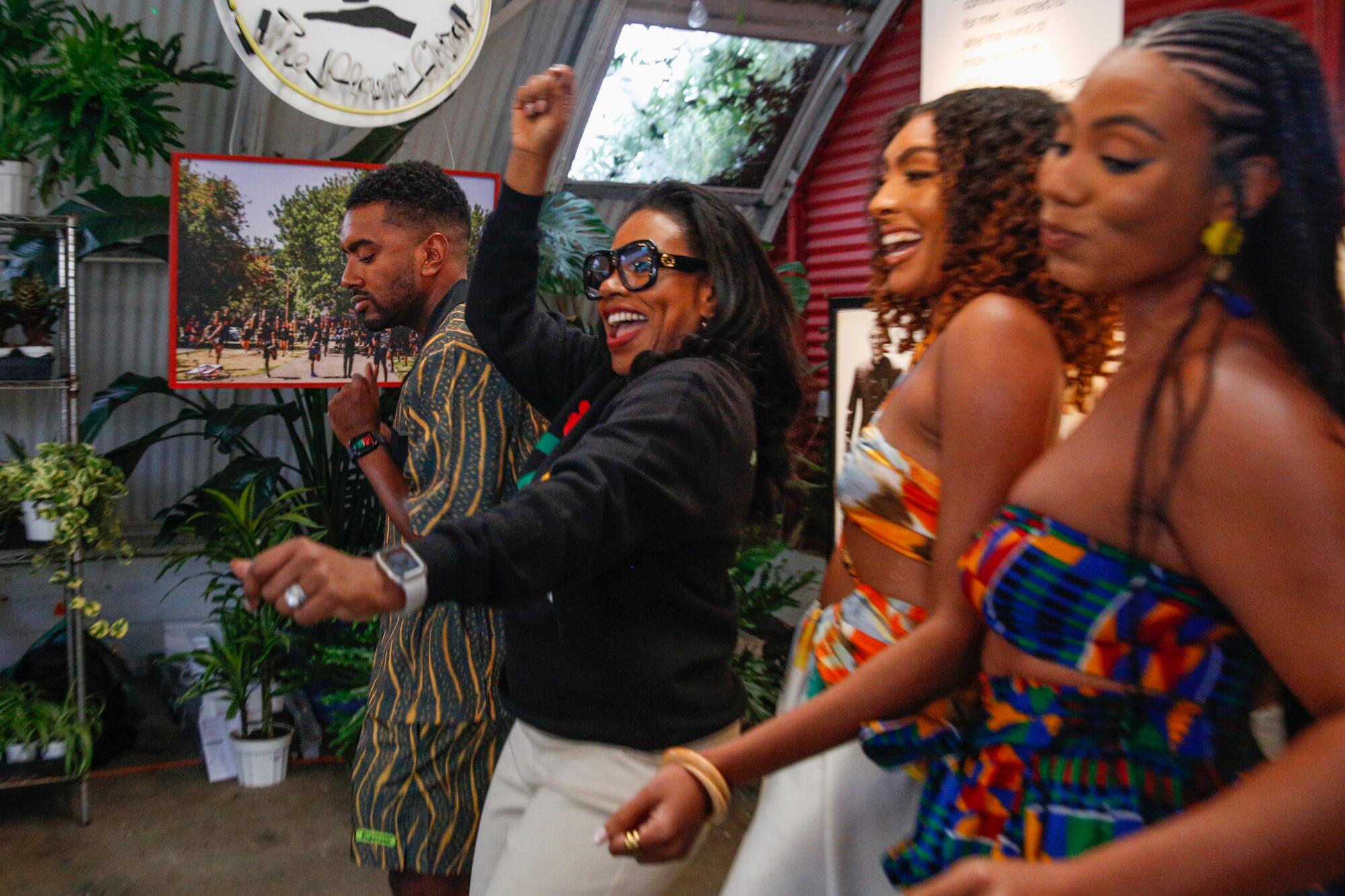
“When I was younger, a lot of my visits to Jamaica I just spent with her,” he said of his grandmother, who died in 2018 at age 90. “After she passed away, I was worried I’d lose a sense of my culture. But her passing has strengthened my bond to the island. I make sure I honor her by going back and making new connections, representing as best I can.”
But his inclination toward healing and wellness also stems from personal trauma. One night in 2013 while studying film at Drexel University in Philadelphia, Maurice was out with friends at a party, blitzing drinks before separating from the pack to hit another bar.
After his cab driver dropped him off, Maurice was approached at gunpoint by a father and son, and shaken down for cash and valuables. Maurice fought back and the men shot at him five times, hitting him twice in the leg and grazing him above his eye once.
“I was blackout drunk, I don’t even remember leaving the bar I went to,” Maurice said. “There’s security footage of the corner store that shows me walking, hobbling on one leg and getting on the hood of the taxicab and begging him to help me.”
Maurice woke up in the hospital the next morning, where he pieced together the details from the footage along with what he heard from friends. The incident was a wake-up call — after years of partying hard, he became determined to get sober.
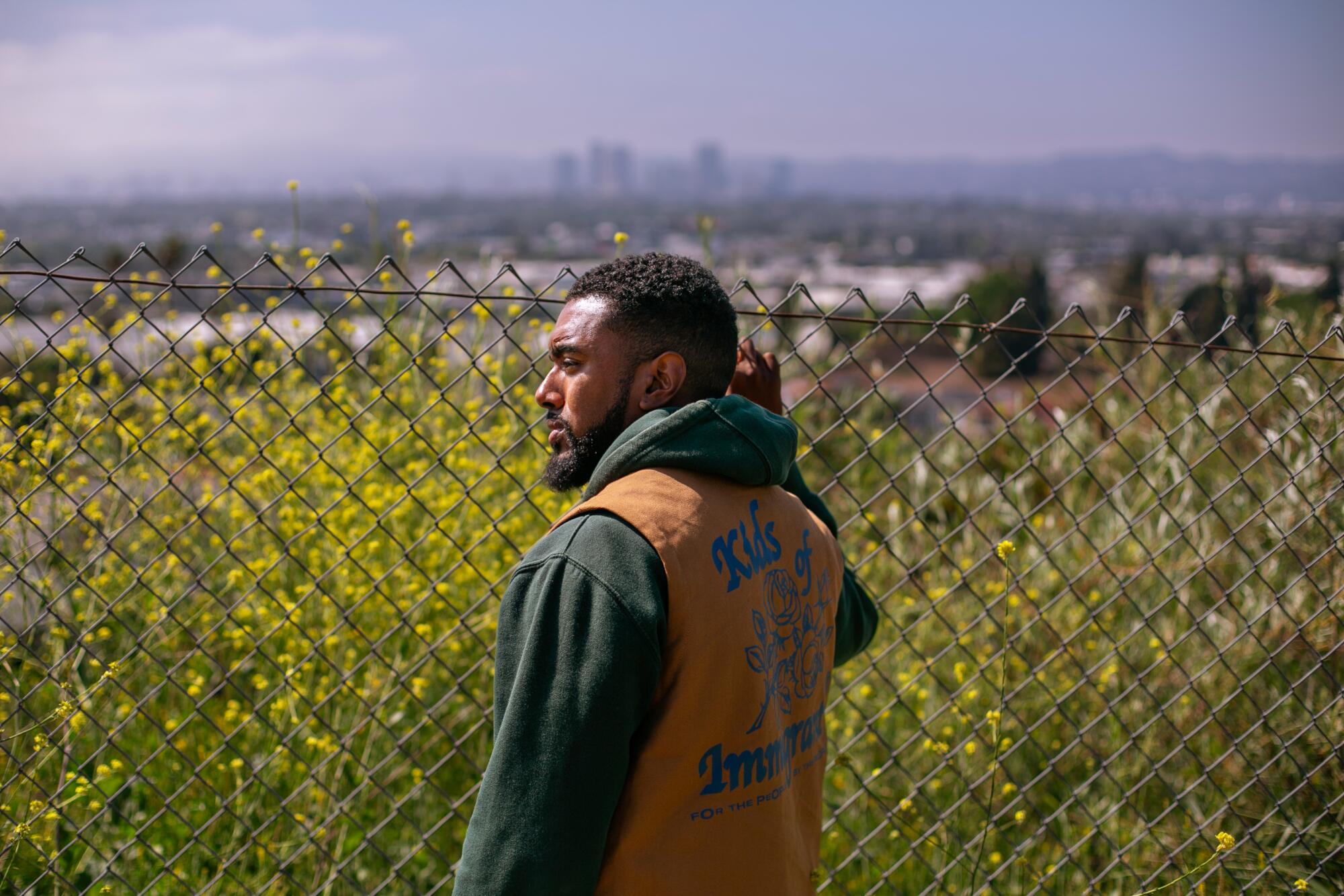
“We still need support from the city,” Maurice said of WalkGood LA. “We’re doing the work the County Department of Mental Health is just not doing.
He found strength by reclaiming his story, defining himself as a survivor of gun violence rather than a victim. Once back in L.A., he turned his attention to his physical health and joined running clubs (he credits Alrick Augustine, better known as “Butta,” and his “Keep It Run Hundred” nonprofit for inspiring him to create WalkGood).
Now three years in with WalkGood, Maurice’s eyes are on expansion. His primary goal is securing a permanent, bricks-and-mortar building to headquarter WalkGood, doubling as a wellness center and creative studio for his WalkGood Productions film company. And as grateful as he is for Supervisor Mitchell’s assistance, along with the multiple brands that have come aboard as sponsors, he’s hoping the city and county of Los Angeles can do more to support the organization.
“We still need support from the city,” he said. “We’re doing the work the County Department of Mental Health is just not doing. And we haven’t gotten any government funding — we’ve asked. They know what we’re doing, we just haven’t gotten support.”
More to Read
The biggest entertainment stories
Get our big stories about Hollywood, film, television, music, arts, culture and more right in your inbox as soon as they publish.
You may occasionally receive promotional content from the Los Angeles Times.

